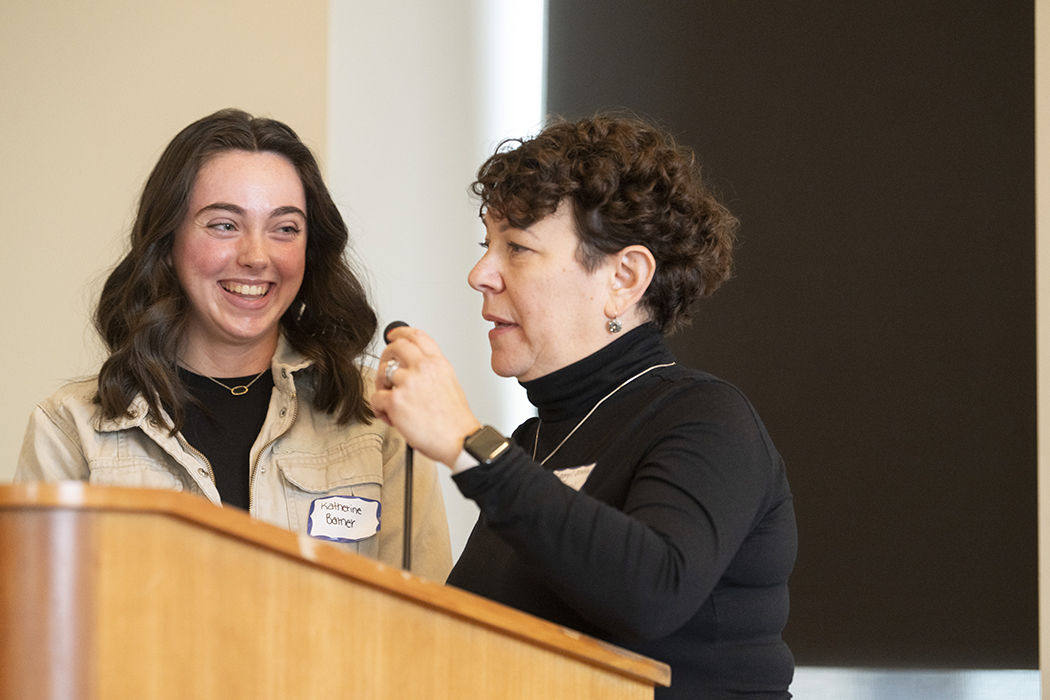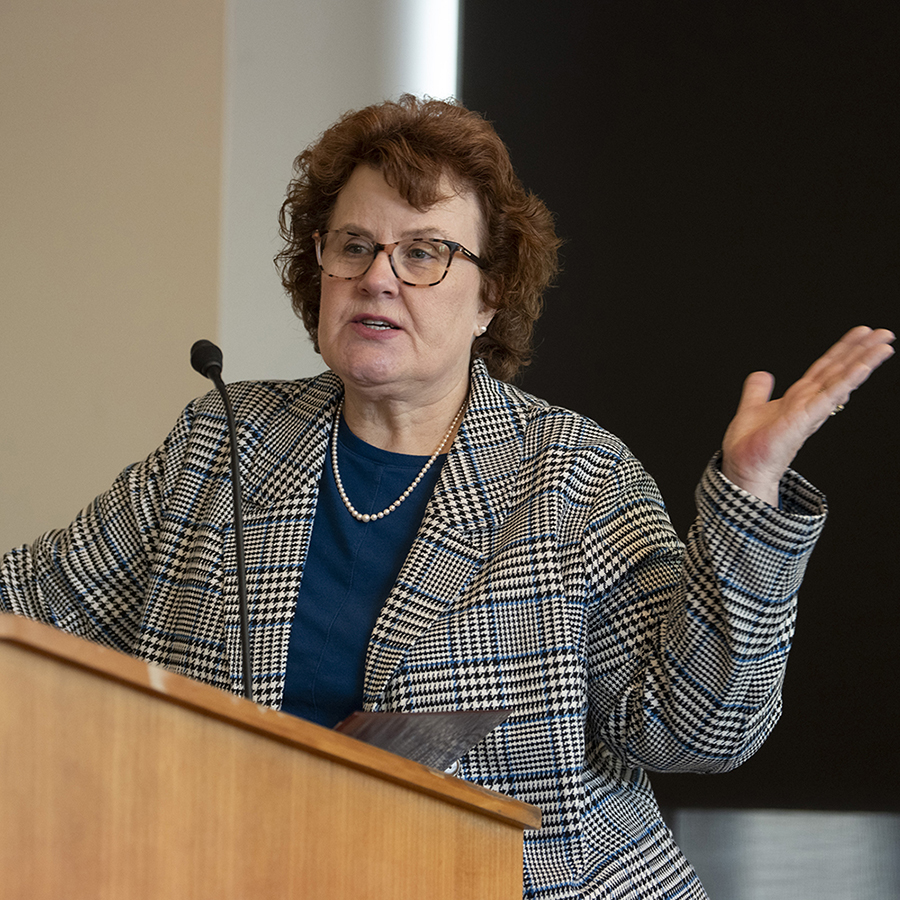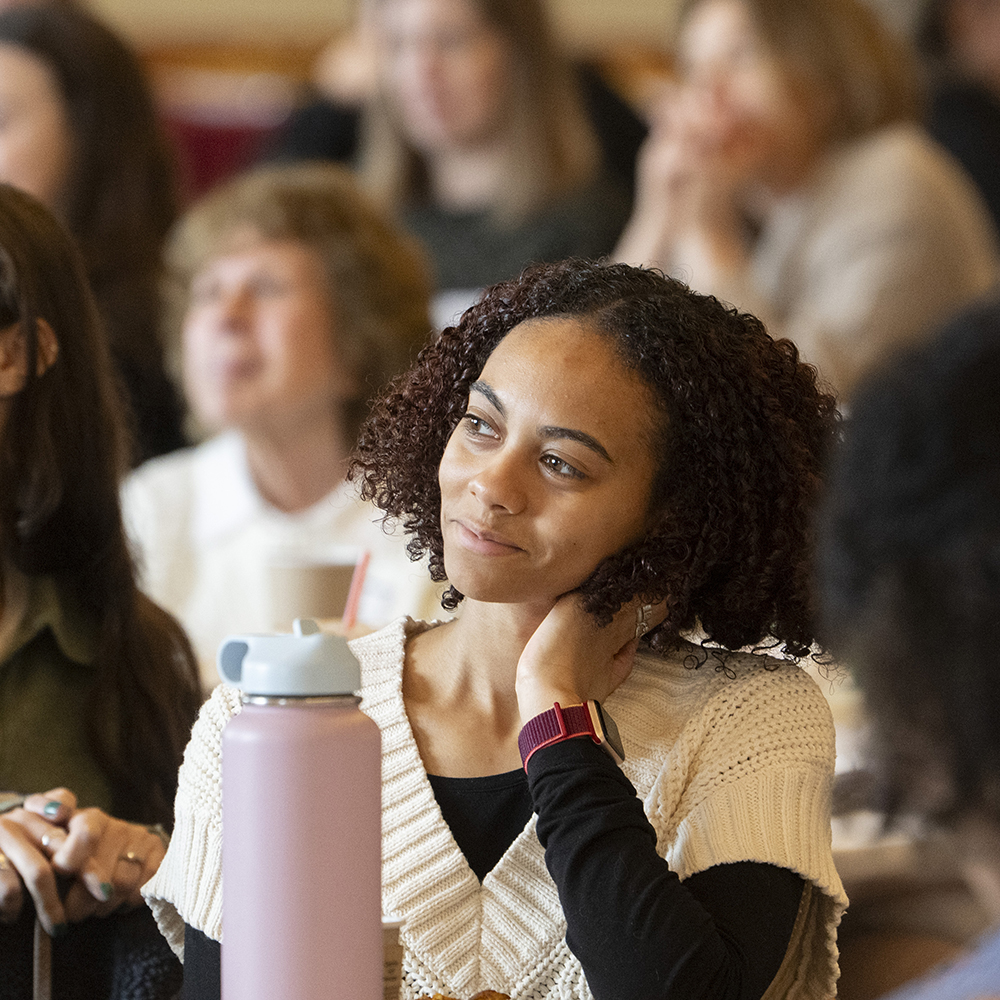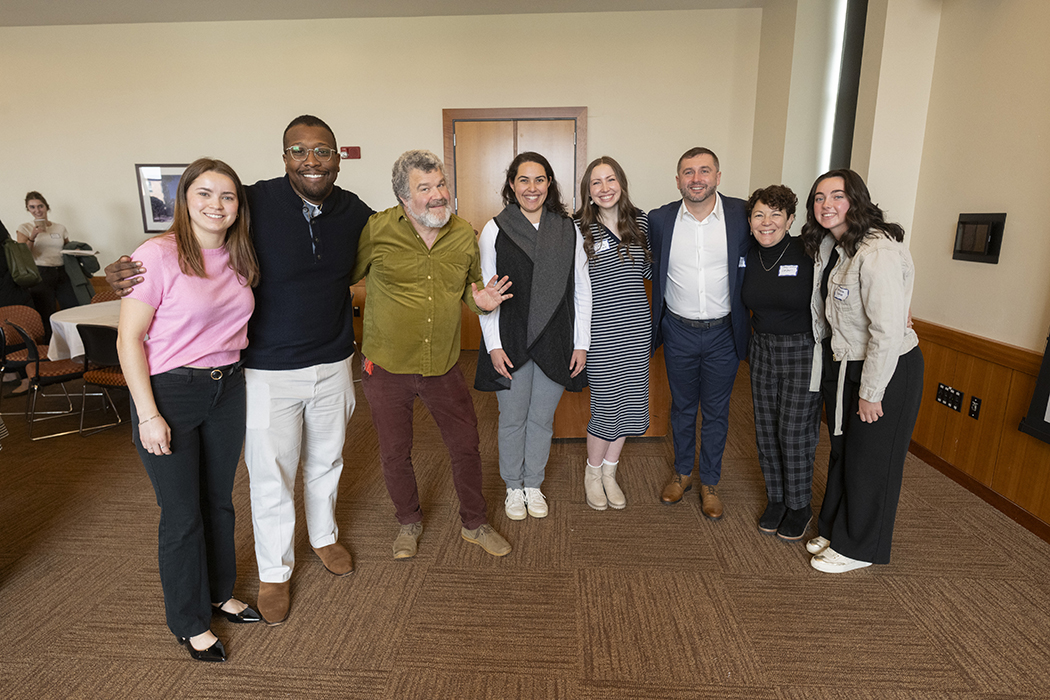
Kate Barner and Sheryl Olshin discuss their professional relationship at the 42nd annual Mary Mason Field Instructor Appreciation Breakfast, which celebrated supervisors for their year-long commitment to BCSSW students. Photos by Tony Rinaldo.
It was fall 2024, and Kate Barner was serving as an intern with the Integrated Care Management Program at Massachusetts General Hospital.
Barner was tasked with supporting patients with complex health issues, a role that included identifying health risks, coordinating care across providers, and facilitating communication among hospitals, rehab centers, and patients’ homes.
A month into her internship, Barner, then a student in the Advanced Standing program at the Boston College School of Social Work, was assigned to a patient with a history of alcohol abuse.
During a routine visit to the patient’s home, Barner sensed that something was wrong. The patient, typically welcoming, didn’t come to her door. Her eyes were bloodshot, suggesting that she had been drinking. And her pillbox was full of medication that she had failed to take.
For the first time, the patient made passive comments about suicide and asked Barner to leave.
Barner stepped outside and called her supervisor, Sheryl Olshin, who had worked with the patient since 2022. Barner wanted to know whether Olshin thought that she should call 911 to facilitate a wellness check. Olshin reminded Barner that the patient “had the right to make bad decisions and continue to drink,” but acknowledged that Barner had valid concerns.
Ultimately, Barner decided to call 911—and the patient has remained sober ever since.

Susan Coleman, assistant dean of field education, acknowledged students for the positive impact they’ve had on the professional growth and development of their supervisors.
Barner and Olshin shared this inspirational story from the field as part of the 42nd annual Mary Mason Field Instructor Appreciation Breakfast, an event celebrating supervisors for their year-long commitment to BCSSW students.
Reflecting on their experience in April at the Yawkey Center, they both said that their professional relationship grew stronger and more collaborative as a result of the challenges they faced in working with the patient who suffered from alcoholism.
Barner learned to lean on Olshin for guidance and became comfortable asking for help. “As interns,” said Barner, who graduated in May, “we often want to impress and showcase our abilities, but I realized it was okay to ask for help and to be vulnerable in that way.”

Countless students, faculty, staff, and field supervisors attended the appreciation breakfast.
She credited Olshin with imparting a nugget of wisdom that figures to serve her well throughout her career: Social workers can only control the intervention, not the outcome.
“That idea has grounded me throughout this internship,” she said, “and I know it will continue to guide me in future cases.”
Olshin, for her part, came to trust Barner’s clinical instincts and gave her more freedom to work with patients over time. She even discovered that her intern had reshaped her perspective on the patient with alcohol use disorder.
“It was really Kate advocating for her position and for [the patient’s] safety that got me to notice and rethink my perspective,” she said. “It felt uncomfortable to have this young, fairly new intern telling me something about my client, but I had to admit to myself that she was right.”

Students and supervisors pose for a group photo at the appreciation breakfast.
During the 2024-2025 academic year, Barner was one of 500 BCSSW students to participate in field education—a cornerstone of the School’s mission to connect classroom learning with real world experience.
BCSSW partners with more than 1,000 agencies in Boston and beyond to offer placements of all kinds, from clinical practice with individuals to macro experiences with communities.
This year, students completed placements in settings such as public schools, governmental offices, and nonprofit agencies. They also worked in public libraries, YMCAs, and numerous treatment centers focused on addiction, disordered eating, and other major mental health challenges.
In opening remarks, Susan Coleman, assistant dean of field education, acknowledged students for the positive impact they’ve had—not only on the communities they’ve served but also on the professional growth and development of their supervisors.
“Please know, students, that you have changed your supervisor’s professional path by all that you have shared with them,” said Coleman, who noted that the appreciation breakfast was named in honor of the longest-serving director of field education at BCSSW. “My hope for us all today is that we can look back on our professional lives and identify and thank those who made us who we are today.”
Throughout the celebration, a slide show honoring social work pioneers played in the background. Among them was Whitney Young, Jr., a champion of civil rights who became president of the National Urban League in 1962. Also featured was Frances Perkins, who helped write the New Deal in the 1930s, and Armando Torres Morales, who, in 1971, became the first Latino to earn a doctorate in social work in the U.S.
Coleman urged attendees to see themselves in these stories of social work pioneers—to find a cause that matters to them, join ranks with like-minded people who want to make a difference, and then use their voices to call attention to the needs of others.
“We need to lean on each other, know what we do well and do it really well,” she added. “Hope may be hard to find in some situations but solidarity is not. Please take time to rest along the way but please keep at it. Our communities need us to do so.”

